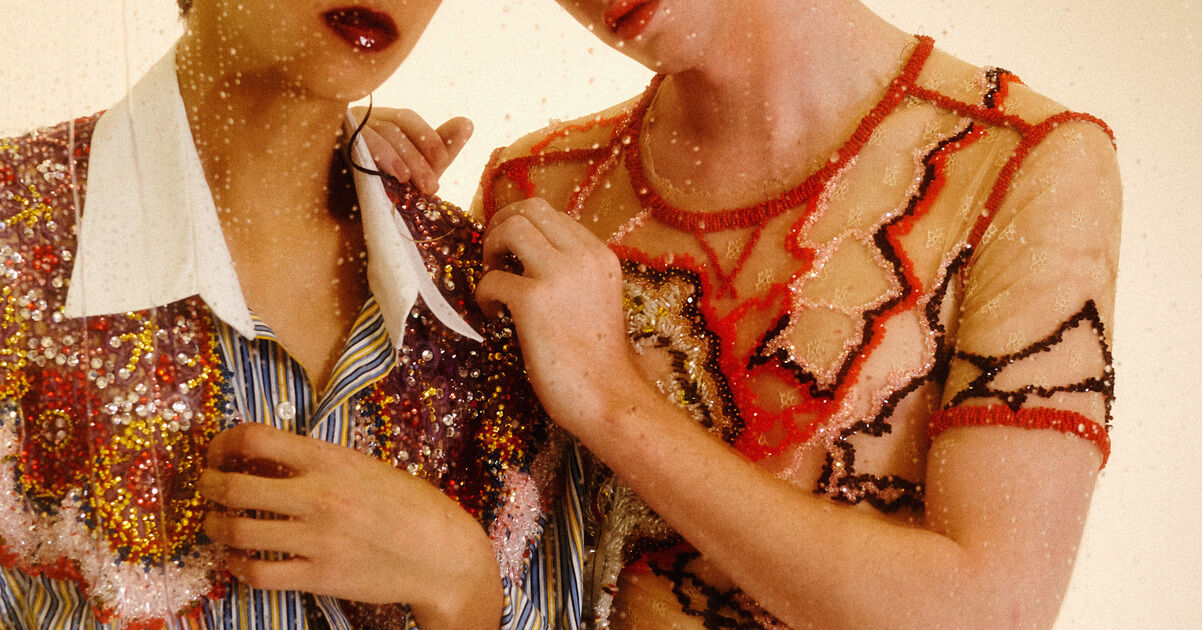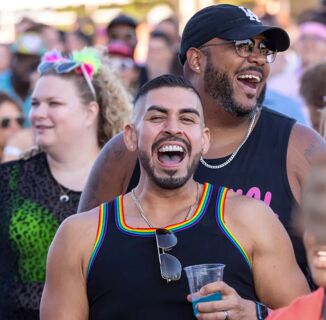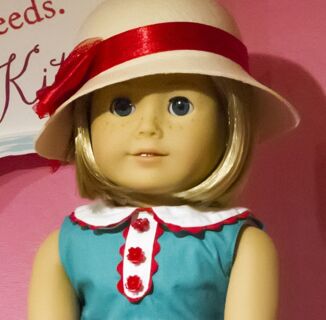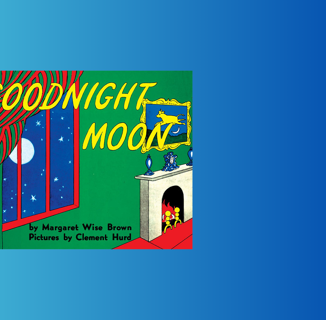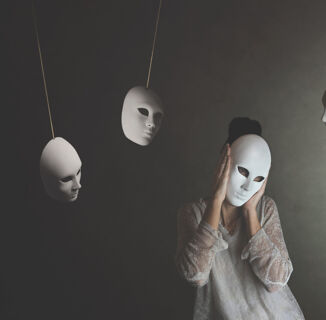When it comes to “Masc4Masc,” photographer Michael Beckert has had it. Officially.
Fed up with the misogyny and homophobia of the troublingly common dating “preference,” Beckert set out to celebrate effeminate queerness in a new photo series titled “Femme Only.” The portraits feature people from across the gender spectrum in a variety of frilly fashions by New York-based label NIHL, and they’ve got us feeling all warm and femme-y inside.
Check out Beckert’s statement along with interviews from his subjects below.

“As a cis gay man who is not particularly masc, I find myself questioning my own internalized desire for masculinityboth in my partners and in myself. Would I still admire masculinity if the media hadn’t taught me to? How have I been limited by the ways I’ve learned the hierarchal value of gender presentation?
From these questions, “Femme Only” was born, a portrait series aimed at celebrating what masc-favoring men fear: unapologetic femininity. Fear of the femme is, on gay male-oriented dating apps, fear of effeminate queernessfear of “girly” people. In this fear, though, is a larger fear: that of women in general.
While all of us within the queer community have faced some degree of oppression and discrimination in society, “masc 4 masc” gays respond to this discrimination destructively by distancing themselves from the further marginalized femmes. “Femme Only” explores the world that could be created by embracing femininity and finding freedom from the gender binarya world my subjects and I are hopeful for.”
Jamie McGregor (@_jamiemcgregor)

“My name is Jamie McGregor, I’m 22, and I generally answer to male pronouns but also ~whatever~ if you call me female pronouns, I don’t really care 🙂 I live in Queens, New York. I was raised in Queens but I’m from Northern Ireland.
When I was younger my femininity was my worst enemy. I was always called “sensitive” by my family and I went to a catholic school where being gay was was not acceptableat least that was the impression that I got. I always wanted to just completely fit in with the other boys, but my limp wrist and girly voice were always something the guys liked to pick on. To be honest I do not see myself as ‘femme,’ but I know that’s how the world around me views the way I act and the way I talk. So sure, I’m femme.
Style is part of expressing my femme identity, but I wouldn’t necessarily say that fashion is. I absolutely loved wearing Neil Grotzinger’s beautiful and cool clothes that made me feel like a million bucks, but I went home in a black T-shirt and black jeans and I was still myself. David Bowie is a perfect example of what I’m talking about. He was undeniably himself.”
Hamp Haynes (@hayump)
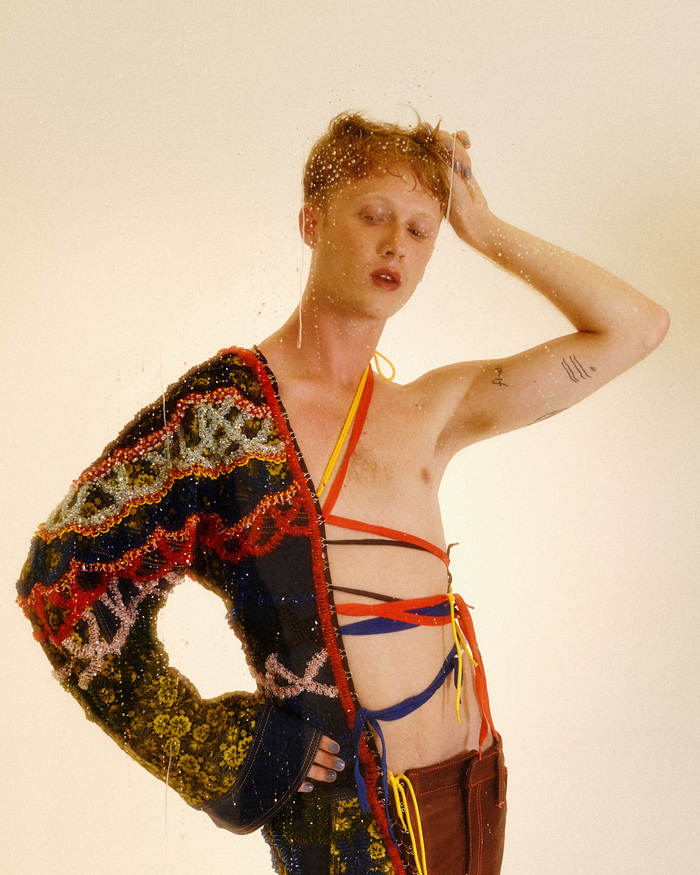
“I’m Hamp Haynes, I’m 22 and a student. My preferred pronouns are he/him. I grew up in a small town on a lake in Alabama, but I have now lived in the East Village for four years.
Being femme to me means celebrating a side of myself that the world has pressured me to hide since before I was born. Being femme comes with no conditions or restrictions and allows me to actively express the most beautiful parts of myself in any way I choose. Femme is punk rock! It is being fully marginalized by society and then saying ‘Fuck the rest of the page; let’s have a party in the margin!’ There are still times when I struggle, when I hold back and do not allow myself to shine because I am afraid. But over the last few years, I’ve realized that the best me that I can be is, well, just me. Femme is being your authentic self.
When members of our community stop putting each other down, when we address internalized homophobia, toxic binary systems that exist, and when we stop labeling and categorizing everything under the sun, maybe people will begin to realize that we are indeed all in this together. It sounds cliché, but it is true. When we realize that we are all just one organism, it becomes blatantly obvious that prejudice reflects one’s own insecurities, fears, and self loathing, and then one can ask, ‘Why do I hate myself so much?’ Being an ally to someone truly means being an ally to oneself. In the words of Mother Ru, ‘If you can’t love yoself, how in the hell can you be an ally to somebody else?’”
Quinton Mulvey (@quintonmulvey)

“My name is Quinton. I am 21 years old and I use he/him pronouns. I currently live in Williamsburg, but I grew up in upstate New York outside of Albany.
As a femme-identifying gay man, my femme experience has been a process of shedding masculine stereotypes that many gay men in my life adhere to. The gay community has historically fetishized masculinity and treated femmes as inferior or less desirable. For me, being femme is about advocating against queer sexism and other heteronormative themes that still plague the community I function within every day.
That being said, my femme experience is also about taking ownership of my femininity in all spaces, even when it’s uncomfortable, and supporting the gender expression of my loved ones. Either way I look at it, identifying as femme feels like a dialogue I am constantly participating in.
Wearing traditionally feminine clothing came naturally to me before I could even grasp the cultural cues and symbols of dress. I think I’ve been wearing clothing marketed to women since I was 6 years old. While my personal style has played a role in the development of my femme identity, I would not say it plays an important role in my expression as a femme-identifying person anymore. Now I express my femininity in more interpersonal ways, like providing safe spaces for my femme-identifying friends, and educating my family about pressing social issues.
White, masc presenting, gay men are one of the safest, most privileged groups in the LGBTQ community. They can use this position of power and privilege to effect enormous positive change. I encourage people to amplify the voices at risk of being silenced by asking what kinds of support their queer peers of color need. I also encourage people to actively listen to QPOC and actually follow through to the best of their ability.”
Bailey Skey (@zah)

“I’m Bailey, I’m 22 and use they/them pronouns. Right now I’m living in Bushwick. I moved to New York from Seattle in January. I’m a multidisciplinary artist and play industrial/electronic music as Nightspace.
My femininity has been a part of me since as long as I can remember. I’m so grateful I didn’t grow up under restricting circumstancesI’m always exploring and growing into my own femininity. Society tends to make us feel the need to suppress the ‘unconventional,’ so it’s definitely a process learning to embrace and love yourself. My femininity is a huge influence in my life and to my identity.
I let my style be an extension of myself, unapologetically me. Your self-expression tells a storylet it tell yours and no one else’s. I hone everything about myself, even what people don’t like or makes them uncomfortable. It’s rebellious. If you confidently shine, it inspires others to do the same. Usually what someone doesn’t like about you is what they don’t like about themselves and haven’t learned to love. Maybe our mere existence can catalyze change.
I really admire Arca and Björk, to name a few. I also just draw inspiration from everyone I know and surround myself with every damn day. I’m moved by anyone who’s unapologetically and beautifully themselves.
As a POC I’m constantly exploring the intersectionality of myself, noticing the privileges I do and don’t attain, where they occur, where I’m handed opportunities and where I’m tokenized. It can be hard deciphering whose support is performative and navigating these art scenes and subcultures. Ultimately I can see right through anyone by how they treat me, even when they trick all these ‘radical’ whites into thinking they’re good people.”
Jordan Figueroa (@highbrw)
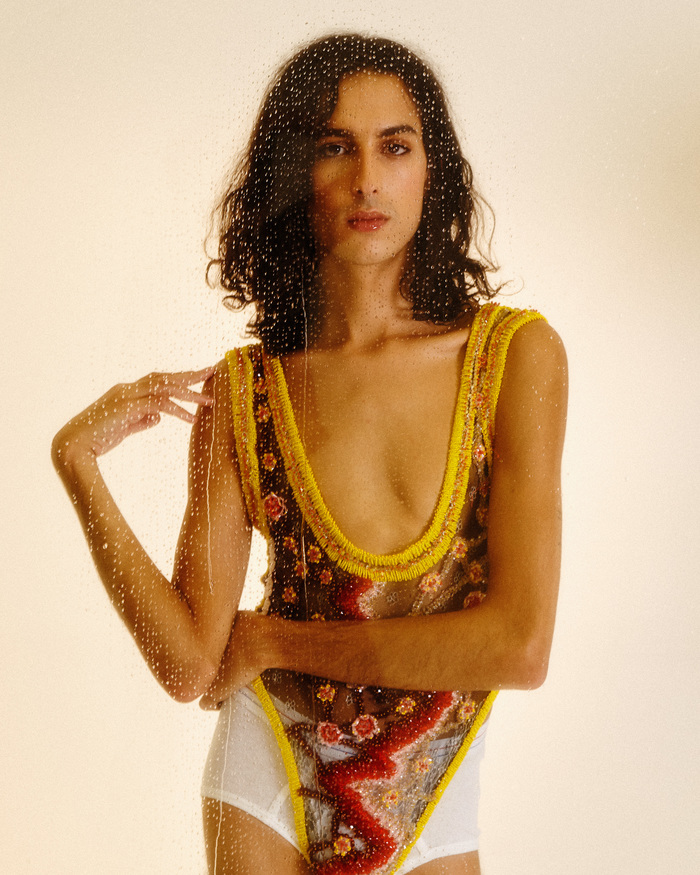
“I’m 23, a student/stylist/curator/human hanger. I use he/him pronouns. I was born and raised right outside of Hartford, Connecticut. I’m currently still in Connecticut finishing my BA in Art History.
Being raised in a predominantly conservative state AND being LatinX created a struggle for me being femme. Latin Americans have a weird relationship with machismo, so I was always monitored by my dad to ‘act like a man’ whenever my femme was showing, creating crippling anxiety issues and intense self-consciousness. (Of course i didn’t let that stop me from prancing around the house in my mom’s heels and makeup when I was home alone.)
I used art and music as an outlet to channel the suppression, as most kids do, and it helped me cope with a lot of anger and confusion. When I found out I was going to a Catholic high school I freaked, but I ended up having a surprisingly positive experience. Everyone was so nice and accepted me for the little queer, high-pitched, eccentric boy that I was. It helped me realize that not everyone is horrible and inspired a spark in me to be who i want to be, when i want to beand not have to apologize for it.
After I graduated when I was 17 I decided to move out, and it was the best choice I ever made. Being independent allowed me to catch up on life by exploring gender identity and surrounding myself with open-minded individuals. Shedding the layers of negativity that formed during adolescence is an ongoing process, but tbh it’s exciting. I ended up with friendships that will last a lifetime and a view of the world that not everyone is lucky enough to understand.
Style is a HUGE part of expressing my femme identity. In most cases if I go out in public pulling a look that’s a little too out there for people, i’ll get a prolonged stare of confusion, orif i’m luckya trip, but i live for those moments. I utilize clothing as an opportunity to expose someone to something they don’t see everyday, normalizing the femme. They’re an outlet to help remind people that not everyone is the same and that’s a good thing. Imagine if we lived in a homogenous society. Scary right?
The portrayal of femme men in mainstream media is actually extremely sad and frustrating. I don’t really watch television but when i do, most of the time femme men are painted as an archetypal caricature, usually providing comedic relief. The world needs to see more complex portrayals of femme men that are talented, educated, and woke. There needs to be a bigger dialogue of femme people who instigate conversations that others are too afraid to have. If you’re waiting for the right time to make people feel uncomfortable and expand their boundaries, you need to wake up. That shit happened like last year.”
Richie Shazam (@richieshazam)
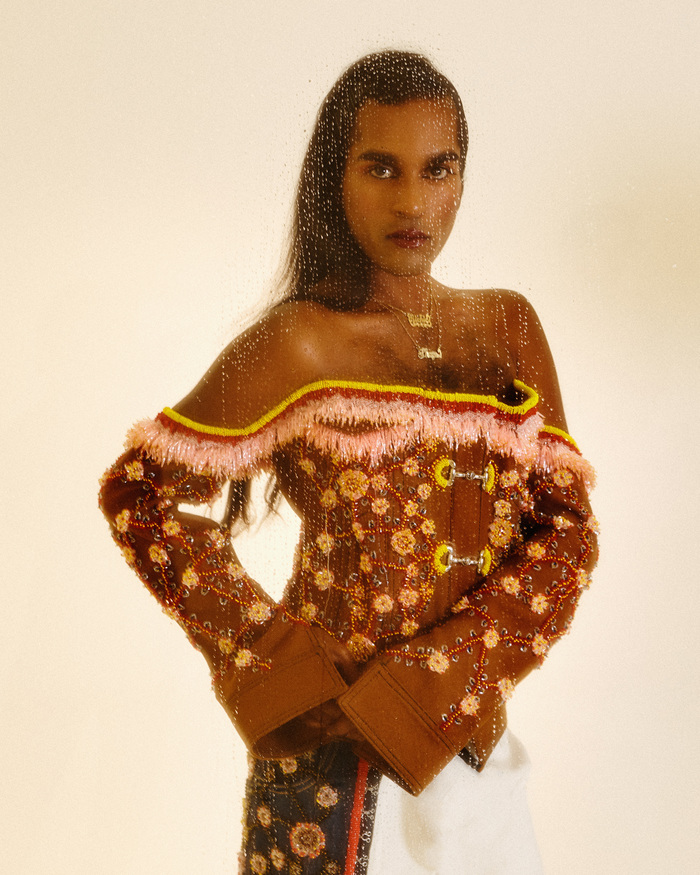
“I’m Richie Shazam. I am over gender pronouns. I live in NYC, born and raised.
To me femme means vitality, power, strength and endurance. Being comfortable in my skin and treating my reflection in the mirror with respect and gentleness has been an ongoing practice.
Style is definitely an essential part of expressing my femme identity as it’s a way of projecting the inner workings of my being. I want to challenge the notions of what masculinity should look like by upending all of the limitations that have been imposed on all levels, especially socially. To showcase my freedom, my queerness, and my evolution through style has been essential.
The constant harassment and vilification of femme men is rampant, especially for femme individuals of color. It makes it difficult for femme individuals to express themselves freely. Survival and community are essential and the necessary awareness on all levels is imperative to keep the dialogue flowing. Allies is a tricky term. I believe that if someone is not willing to take action when someone is being harassed or bullied, they are a part of the problem. ‘Allies’ is almost a non-operative word. I don’t need someone to show sympathy, rather they need to take action and stand up with us if they are actually for us.
They are endless negative consequences in being a femme individual. I always try to hold my head high and know that I am supported by my community. It is my duty to continue to be myself and to live my authentic truth in crushing the gender binary. Feeling unsafe is an everyday reality. It weighs deeply on my heart and spirit, but my acceptance of this harsh reality has not broken me. It has propelled me to continue to advocate and to continue thriving by living authentically and freely.”
Photography / Concept by Michael Beckert @michael_beckert
Produced by Oly Innes @ollyw00d
Assistant Producer & Stylist Blair Cannon @blairbnb
Tech by Lea Winkler @leabwinkler
Designs by Neil Grotzinger @nihl.nyc
Makeup by Rachael Krutchkoff @rocky_mua
PA’s, Olivia Sulkowicz @oliviasulks, Sasha Frolova @sashafro
Help make sure LGBTQ+ stories are being told...
We can't rely on mainstream media to tell our stories. That's why we don't lock our articles behind a paywall. Will you support our mission with a contribution today?
Cancel anytime · Proudly LGBTQ+ owned and operated
Read More in Culture
The Latest on INTO
Subscribe to get a twice-weekly dose of queer news, updates, and insights from the INTO team.
in Your Inbox

